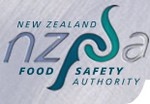Small steps towards accepting food safety 'comparability'
A well-known cheese advertisement in New Zealand tells us that “good things take time”.
Just as this may be true of cheese – or wine, I might add – it is certainly true of trading relationships.
I cannot over-emphasise the value of the mutual trust and confidence built up by a history of trade between countries. This is particularly so when it comes to trade in products where there are potential food safety or public health risks.
The World Trade Organization’s sanitary and phytosanitary (SPS) agreement is the international mechanism for ensuring acceptable levels of human, animal and plant health in trade between nations. In terms of trade in food, the SPS agreement provides general guidelines on the concept of ‘equivalence’. These guidelines allow trading partners to accept that, while two countries may have different inspection and certification systems, both are capable of giving consumers the same – or an equivalent – level of food safety protection.
Equivalence has now become part of the international language of trade. It is an important and useful concept. But in my view, and in the view of some of our long-term trusted trade partners, we’ve all got a bit bogged down in the details of how we determine the ‘equivalence’ of a trading partner’s systems.
Some countries are very prescriptive in their interpretation of equivalence. These countries drill beneath the high-level legislative, administrative and operational systems of their trading partners, right down to individual control measures. This may be as pointless as requiring meat to be inspected for diseases that have long been eradicated in the exporting country.
Other countries take a high-level view of what ‘equivalence’ means, and focus on food safety outcomes. These countries are happy to allow their trading partners to get on with the business of ensuring the food they export is safe and suitable for its intended purpose, and that when unexpected incidents occur – as they invariably do from time to time – the problem is fixed, swiftly and effectively and does not pose a risk to consumers in the importing country.
In New Zealand’s view, and that of our quadrilateral group trading partners (Australia, Canada and the United States), this interpretation of equivalence is more aligned with a concept we are calling ‘comparability’, which we are interested in exploring further.
Determining if a trading partner has equivalence at all levels of the food production chain can be extremely resource-intensive for importing countries that choose to inspect and verify their trading partners’ food safety controls. Any subsequent changes or improvements to the approved systems must also be checked and mutually agreed to.
Alternatively, you could accept that you and your trading partner have comparable food safety and public health aims and ways of doing things. This relies on you making well-informed judgments that the overall food safety and suitability outcomes of different food safety programmes employed in each country are similar.
Some countries have a long history of bilateral trade, and a high level of trust and confidence in each other’s systems and controls that experience has shown to be justified. They have similar public health systems and goals, and mutual expectations that both trading partners will continuously evolve and improve their food safety programmes based on sound science.
This being the case, we should reduce the resources we put into checking things that don’t make a difference. Instead, we should be saying to each other: ‘these are our expectations in terms of food safety and public health outcomes; how you achieve them is up to you”.
This approach will free up our resources to focus on areas where there are real risks from trade in food products. Or, where trade is from countries where the regulatory programme and controls are not at the same level as ours or where an adequate degree of trust and confidence has not yet been established between the trading partners.
This is radical thinking in terms of world trade. It relies on a high degree of trust and an absolute understanding that you and your trading partner are on the same page in terms of your food safety aims and expectations. If something does go wrong, you have to be able to pick up the phone, explain, and have your trade partner understand and accept that you’re dealing with it appropriately.
In the food safety arena, where the stakes are high, we need to take small steps when exploring new ideas like this. That’s why New Zealand and its quadrilateral partners are starting to assess the viability of comparability by using meat hygiene systems as a case study. We’ve put together draft guidelines for judging the comparability of meat hygiene systems and have started talking to the quadrilateral countries and the EU to progress mutual acceptance of meat hygiene programmes applied to meat in trade. A working group made up of specialists from those countries is preparing to discuss the draft guidelines at a meeting in Europe in March.
